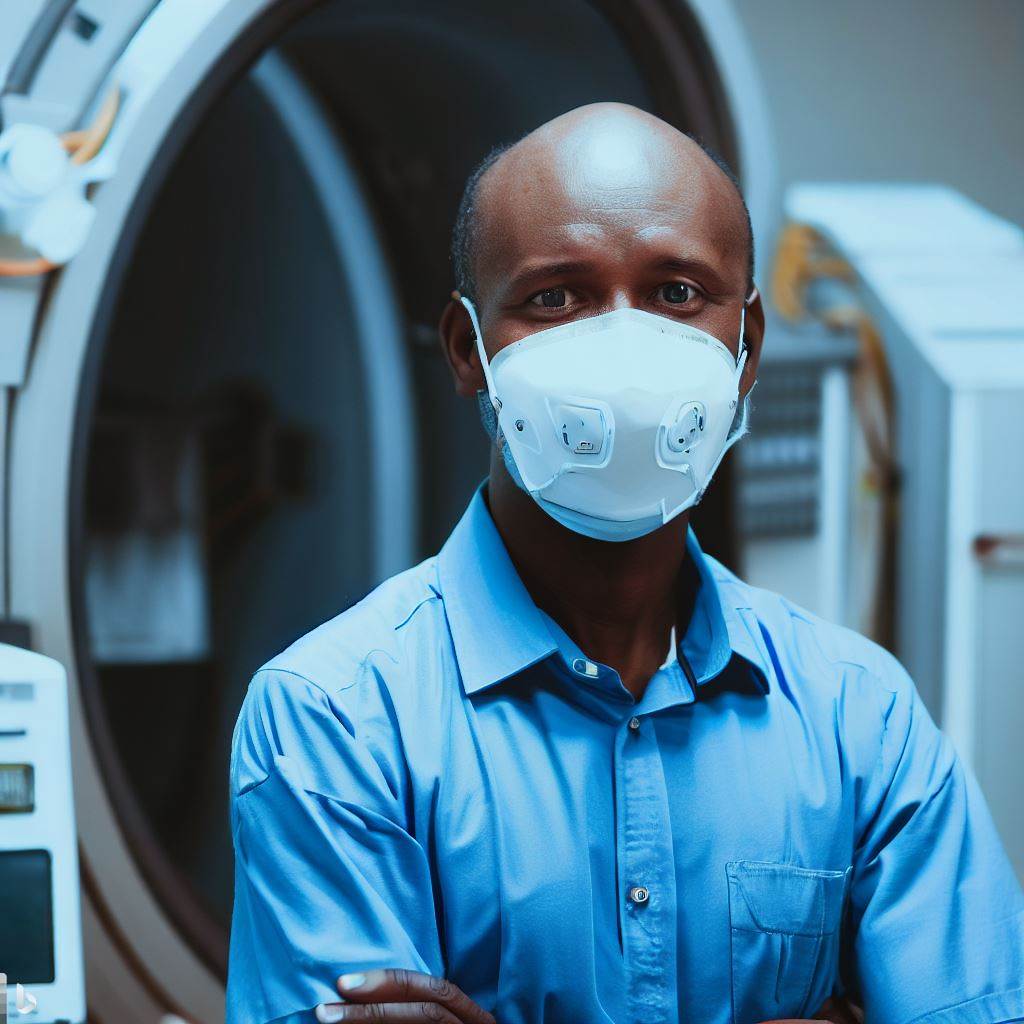Introduction
Radiation therapy is a vital component of cancer treatment, and becoming a radiation therapist in Nigeria requires specialized knowledge and training.
This blog post will provide a comprehensive guide on the steps and requirements to pursue a career in this field.
Radiation therapy is a form of treatment that uses high-energy radiation to target and kill cancer cells. It is often used alongside other treatment modalities such as surgery and chemotherapy to effectively manage and treat cancer.
As the number of cancer cases continues to rise in Nigeria, the demand for radiation therapists is ever-increasing.
The role of a radiation therapist is diverse and essential. They work closely with oncologists and other healthcare professionals to develop treatment plans and administer radiation to patients.
They also monitor patients during treatment, ensuring that the radiation is delivered safely and effectively.
To become a radiation therapist in Nigeria, individuals must complete a radiation therapy program from a recognized institution.
These programs provide the necessary theoretical knowledge and practical skills required to work in this field.
After completing the program, graduates must obtain a license from the relevant regulatory body to practice as radiation therapists.
Basically, radiation therapy plays a crucial role in cancer treatment, and becoming a radiation therapist in Nigeria is a promising and rewarding career path.
This guide will explore the necessary steps and requirements for individuals interested in pursuing this profession, highlighting the importance of radiation therapy in cancer care.
Role and Responsibilities of a Radiation Therapist
The role of a radiation therapist in cancer treatment:
- A radiation therapist plays a vital role in the treatment of cancer patients through the use of radiation therapy.
- They work closely with a team of medical professionals, including oncologists, physicists, and nurses, to develop treatment plans.
- By operating advanced radiation therapy equipment, they administer precise doses of radiation to target and destroy cancer cells.
- They ensure the accurate positioning of patients, monitor their progress, and make necessary adjustments to treatment parameters.
- Radiation therapists also provide emotional support to patients and help alleviate any fears or concerns they may have.
Explain the responsibilities and duties associated with the profession:
- Radiation therapists are responsible for conducting preliminary assessments to determine the appropriate treatment approach.
- They collaborate with other healthcare professionals to review patient’s medical histories and diagnostic test results.
- Based on this information, radiation therapists develop individualized treatment plans for each patient.
- They educate patients about the treatment process, its potential side effects, and provide guidelines for self-care during and after treatment.
- During treatment sessions, radiation therapists ensure that patients are positioned correctly to target the cancerous area accurately.
- They closely monitor the patient’s progress, documenting any changes or adverse reactions to the radiation therapy.
- Radiation therapists maintain and calibrate radiation therapy equipment to ensure optimal functionality and accuracy.
- They adhere to strict safety protocols to protect themselves, patients, and other staff members from unnecessary exposure to radiation.
- Continuous professional development is crucial for radiation therapists to stay updated with the latest advancements in treatment techniques.
- Additionally, radiation therapists engage in research activities to contribute to the advancement of radiation therapy in cancer treatment.
Essentially, radiation therapists play a crucial role in cancer treatment by delivering precise doses of radiation to target and eliminate cancer cells.
They are responsible for developing individualized treatment plans, educating patients, and monitoring their progress throughout the treatment process.
Radiation therapists also ensure the safety and accuracy of radiation therapy equipment while providing emotional support to patients.
Continuous professional development and research involvement are essential for this profession to stay at the forefront of advancements in cancer treatment.
Read: Key Skills Required for an MRI Technologist in Nigeria
Education and Training Requirements
- Minimum bachelor’s degree in radiation therapy or related field.
- Training options: university programs, medical radiography, internships, and continuing education.
- Certifications validate proficiency (e.g., NSR).
- Licensing from RRBN ensures compliance, public safety, and career advancement.
- Education equips therapists for effective and safe practice.
- Multiple pathways for required training, including hands-on experience.
- Continuing education maintains up-to-date skills.
- Licensure essential for practicing radiation therapy in Nigeria.
- Certifications enhance credibility and job prospects.
- Licensing guarantees compliance, safety, and career growth.
Read: The Role of Optometrists in Nigerian Public Health
Career Prospects and Job Opportunities
Overview of the Job Market for Radiation Therapists in Nigeria
- The job market for radiation therapists in Nigeria is relatively limited.
- There are currently a few healthcare facilities that offer radiation therapy services.
- The demand for radiation therapists is increasing due to the rise in cancer cases.
- However, the number of qualified radiation therapists in the country is still low.
- As a result, there is a shortage of professionals in this field, creating job opportunities.
Growth Potential and Career Opportunities in the Field
- Despite the limited job market, there is significant growth potential for radiation therapists in Nigeria.
- The field of radiation therapy is constantly evolving with advancements in technology.
- This provides opportunities for radiation therapists to expand their skills and knowledge.
- With further training and specialization, radiation therapists can advance their careers.
- They can pursue supervisory roles, research positions, or even become educators in the field.
Demand for Radiation Therapists in Healthcare Facilities
- The demand for radiation therapists is high in healthcare facilities across Nigeria.
- Radiation therapy is an essential component of cancer treatment, and its effectiveness has been proven.
- As cancer cases continue to rise, healthcare facilities are investing in radiation therapy departments.
- This creates a steady demand for qualified radiation therapists to provide these services.
- Hospitals, cancer centers, and specialized clinics are the main employers for radiation therapists in Nigeria.
In essence, the job market for radiation therapists in Nigeria may be limited, but there are promising career prospects and opportunities in this field.
The rise in cancer cases and the need for radiation therapy services create a demand for qualified professionals.
With the potential for growth, radiation therapists can advance their careers and contribute significantly to the healthcare sector in Nigeria.
Read: Future of Optometry in Nigeria: Trends and Predictions

Steps to Becoming a Radiation Therapist in Nigeria
Becoming a radiation therapist in Nigeria involves:
- Research profession details: Understand duties and prospects of radiation therapists.
- Select reputable institution: Choose accredited Nigerian schools offering radiation therapy programs.
- Meet admission criteria and enroll: Fulfill requirements, apply, and join radiation therapy program.
- Excel in program: Actively participate, complete coursework, pass exams for strong foundation.
- Secure certifications and licenses: Fulfill regulatory requirements for legal radiation therapy practice in Nigeria.
- Gain hands-on experience: Pursue internships or clinical rotations to enhance practical skills.
- Apply for jobs and attend interviews: Submit applications, attend interviews, showcase skills, and knowledge.
Follow these steps to achieve a successful career as a radiation therapist in Nigeria.
Read: Success Stories of Nigerian Speech-Language Pathologists
Challenges and Rewards in the Field
Challenges Associated with Being a Radiation Therapist in Nigeria
- Limited access to advanced technology and treatment facilities can hinder effective patient care.
- Inadequate funding and resources may impact the availability and quality of radiation therapy services.
- Shortage of skilled radiation therapists in the country results in high patient-to-therapist ratios.
- Continuous professional development opportunities are limited, hindering career growth and specialization.
- Dealing with the emotional toll of seeing patients suffer from cancer and its side effects.
- Navigating the bureaucratic healthcare system can be time-consuming and frustrating.
- Maintaining a high level of accuracy and precision in treatment planning and delivery is challenging.
- Working long hours and being on-call can lead to physical and mental exhaustion.
- Ensuring patient compliance with treatment protocols and medication adherence can be challenging.
- Dealing with the stigma associated with cancer and misunderstandings about radiation therapy in the community.
Rewarding Aspects of the Profession
- The opportunity to make a significant impact in the lives of patients fighting cancer.
- Witnessing patients’ positive response to treatment and their journey towards recovery.
- Job satisfaction derived from being part of a multidisciplinary team dedicated to saving lives.
- Developing strong relationships with patients and their families, providing emotional support during difficult times.
- Being at the forefront of advancing technology and treatment techniques in radiation therapy.
- The ability to continuously learn and acquire new skills to enhance patient care.
- Contributing to research and innovation in the field of radiation therapy in Nigeria.
- Playing a vital role in cancer prevention and early detection through patient education and awareness campaigns.
- The sense of fulfillment derived from helping patients maintain a better quality of life despite their diagnosis.
- Being part of a profession that is essential in the fight against cancer and improving cancer outcomes in Nigeria.
In fact, being a radiation therapist in Nigeria poses several challenges due to limited resources, shortage of skilled professionals, and emotional demands.
However, the rewards of the profession, including job satisfaction and making a positive impact on patients’ lives, make it a fulfilling career choice.
Despite the challenges, radiation therapists play a vital role in providing essential cancer care and contributing to the advancement of radiation therapy in Nigeria.
Read: The Path to Becoming a Surgeon in Nigeria
Professional Associations and Networking Opportunities
Importance of Joining Professional Associations Related to Radiation Therapy
Joining professional associations related to radiation therapy is crucial for individuals seeking to become radiation therapists in Nigeria.
These organizations provide several benefits that can significantly enhance one’s career in this field.
- Access to Resources: Professional associations offer a wealth of resources, including research papers, educational materials, and industry updates. By joining these associations, individuals can stay up-to-date with the latest advancements and trends in radiation therapy.
- Continuing Education: These associations often organize seminars, webinars, and workshops where members can gain new knowledge and enhance their skills. Continuous learning is vital in a specialized field like radiation therapy, and professional associations offer opportunities to fulfill continuing education requirements.
- Professional Development Opportunities: Membership in a professional association allows individuals to participate in leadership roles, committees, or volunteer programs. Engaging in such activities can sharpen leadership skills and expand professional networks.
- Professional Recognition: Being part of a respected professional association in the radiation therapy field boosts credibility and enhances professional reputation. It shows a commitment to ongoing professional development and adherence to ethical standards.
- Job Opportunities: Professional associations often have career centers or job boards where members can access exclusive job postings. These platforms provide a targeted approach to finding employment and can significantly benefit those seeking radiation therapy positions.
Networking Opportunities Provided by Professional Associations
Professional associations offer numerous networking opportunities that can help radiation therapists in Nigeria build valuable connections and expand their professional circle.
- Peer Support and Mentorship: These associations create platforms for radiation therapists to connect with their peers, share experiences, and seek guidance. This support system allows for the exchange of ideas, advice, and best practices among professionals.
- Collaborative Projects: Through professional associations, radiation therapists can collaborate with peers on research projects, publications, or community outreach initiatives. Such collaborations can lead to professional growth and open doors for future collaborations.
- Conferences and Workshops: Professional associations often organize conferences and workshops where members can connect with industry experts, renowned researchers, and influential professionals. These events offer opportunities for learning, idea exchange, and establishing valuable connections.
- Online Forums and Discussion Boards: Many professional associations have online platforms where members can engage in discussions, ask questions, and share knowledge. These forums provide a convenient way to network and seek valuable insights from experienced professionals.
Relevant Professional Conferences or Events
- Nigerian Association of Radiation Oncologists (NARO) Conference: NARO organizes an annual conference that gathers radiation oncologists, therapists, and other professionals in the field. Attending this event allows individuals to learn about the latest advancements, research findings, and treatment techniques.
- African Organization for Research and Training in Cancer (AORTIC) Conference: AORTIC holds regular conferences focusing on cancer research and treatment in Africa. These events provide a platform for radiation therapists to connect with experts and stay updated on cancer-related developments.
- International Atomic Energy Agency (IAEA) Workshops: The IAEA conducts workshops and training programs related to radiation therapy. These workshops enable professionals to enhance their technical skills, learn about the latest equipment, and exchange knowledge with international experts.
- World Congress of the International Society of Radiographers and Radiological Technologists (ISRRT): This global event brings together radiographers and radiological technologists from around the world. Attending this congress affords radiation therapists the opportunity to network with international professionals and exchange ideas.
In a nutshell, joining professional associations related to radiation therapy in Nigeria provides a multitude of benefits.
These associations offer access to valuable resources, networking opportunities, and avenues for professional development.
By actively participating in such organizations and attending relevant conferences or events, aspiring radiation therapists can strengthen their careers and contribute to the growth of this vital healthcare field.
Read: Occupational Therapy Schools: Where to Study in Nigeria
Conclusion
This blog post has highlighted the key points of becoming a radiation therapist in Nigeria.
Pursuing a career as a radiation therapist in Nigeria offers immense value and potential for individuals interested in this field.




